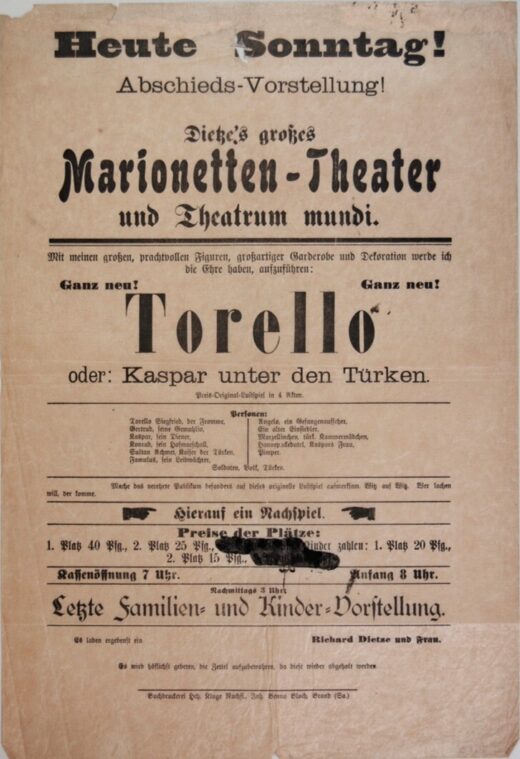
Manuscript
Sultan Achmet
Sultan Achmet is part of a corpus of plays centred on Thorello, the hero of a chapter from Boccacio’s (1313-1375) Decameron. The first attested performance of the play was staged in 1717 in Prague, by the puppeteer Franz Deppe. Sultan Achmet was popular with puppeteers up until the second half of the 19th century. The manuscript described here belonged to the Bonneschky family, which had trained with puppeteer Franz Anton Lorgie (1765-1853). This copy of an older handwritten manuscript was made circa 1880. The notebook was gifted to the collector Arthur Kollmann in 1891, by the widowed August Bonneschky (1827-1892). It is now kept in Dresden, in the Puppentheatersammlung (D4-646)
Jockerle, a stupid character with a stutter, is an equivalent of another comic figure from the traditional repertory—Pimperle: in fact, Jockerle was played with the puppet of Pimperle.
Back after a long time away, a man tries to stop his wife from remarrying
The sultan Achmet and his brother Mustapha deliberate over what to do with their Christian prisoners. Achmet wants to sacrifice some of them to the god Muhammad, while Mustapha advises him not to—because they were both rescued by Christians once. But the laws of the country require that Achmet sacrifice Christians. Casper, who diced the smallest number, will be sacrificed first. But he displays such stupidity that he is eventually spared. Then, Thorello dices the smallest number: he must therefore be sacrificed. The sultan recognises him as the prince who saved him in Pavia eight years before and so he sets him free. Jockerle, Casper’s son, comes to the palace to inquire about his father, on behalf of his mother. In fact, his mother, who remarried, only sent her son to rid herself of him; she hoped he would die during the journey. Jockerle explains that the princess Rosothea, Thorello’s wife, must also remarry.
When Casper reunites with his master Thorello, whom he believed to be dead, he immediately tells him about his wife’s plan to remarry. The Sultan then offers Thorello one the women from his harem. Thorello refuses, and the sultan allows him to go back to Pavia, using magic; it will only take him twenty-four hours to reach it. Casper and Jockerle treat the magician so badly that they are forced to travel on the back of a dragon. In Pavia, the princess Rosothea laments her fate: she has been promised to the count Zittonio, but she would rather enter a convent than marry him. She learns that Thorello came back after being imprisoned for seven years; they reunite. Casper also reunites with Gretel; not recognising him, she speaks badly of him. When Casper slaps her, she goes fetch her new husband, Domerle. Jockerle sets Domerle’s clothes on fire. Then he and Casper pummel him.